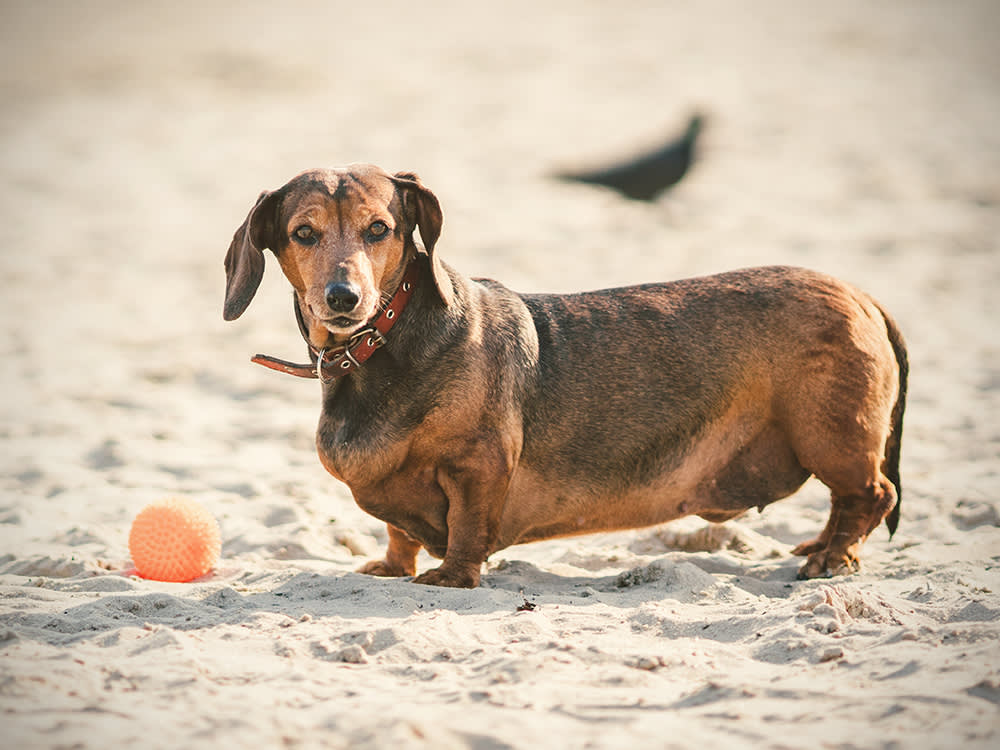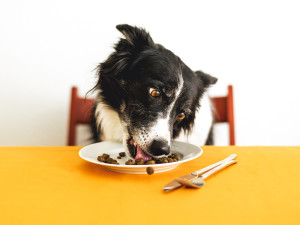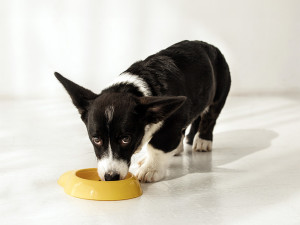What to Know When Your Vet Says Your Dog is Overweight
Don’t take it personally – even if that’s hard to do

Share Article
We love our dogs – no matter what. No one wants to go to the vet and be told that their pup is any less than the perfect angel they are. So, when your dog’s vet comments on their weight, it can feel, well, personal. Did you do something wrong? Is your dog not active enough? Are you feeding them the right food?
First off, it doesn’t help to blame yourself. There could be multiple reasons why your dog needs to shed a few pounds. The Royal Veterinary College (RVC) saysopens in new tab that 1 in 14 dogs are recorded as overweight by their vet each year.
“The reasons for the pet obesity epidemic are the same as the human obesity explosion: we’re eating too much and exercising too little,” says Dr Ernest Ward Jr, a North Carolina veterinarian and president of the Association for Pet Obesity Preventionopens in new tab (APOP). “In addition, what we’re feeding dogs has changed.”
Here’s everything you need to know about obesity in dogs – including how to keep your pup healthy.
Why does your vet say your dog is obese?
Giving your dog a diet high in carbohydrates, sugar and fat makes them overweight, says Dr Ward. They stay leaner and healthier with a higher protein diet.
On top of poor nutrition, you may be giving your dog too much food. Many people rely on a combination of guesswork and feeding instructions to determine how to feed their dogs rather than working out a diet tailored to their specific pup.
You may not know how many calories they need (far fewer than you think) or how many calories are in the food (often more than you think). Calorie counts aren’t on most food labels, and when calorie counts are included, some can be confusing and inconsistent.
And then there are the add-ons – treats, jerky, table scraps – which certainly add up. “If I could only point to one factor causing the modern-day pet obesity epidemic, it would have to be treats,” says Dr Ward. “It’s that seemingly innocent extra 50 calories a day in the form of a chew or cookie that adds up to a pound or two each year. By the time a dog or cat reaches mid-life, they’re overweight and health risks begin to skyrocket.”
The risks of obesity in dogs
Weight control is about the quality and duration of their lives.
“While those extra five pounds around your waist might not mean much to you and your health, that extra five pounds around your average dog and cat can pose a lot of health risks,” says Dr Maria Manrique, a Chicago veterinarian and spokesperson for the American Veterinary Medical Associationopens in new tab (AVMA).
The AVMA links pet obesity directly with diabetes, cardiovascular disease and hypertension, as well as an increased risk for cancer and orthopaedic problems, including painful and debilitating knee injuries and arthritis. In addition, overweight dogs are more prone to heat exhaustion and exercise intolerance.
How to keep your dog healthy
The key to good health for your dog? Getting a jump on the problem. Maintaining a healthy weight for your dog is lot easier and less expensive than treating the conditions that result from being overweight. Feeding your dog a healthy diet and giving them consistent exercise will not only save you money – it will also spare your dog discomfort and suffering, as well as extend their life.
Indeed, a 14-year benchmark study of Labrador Retrievers showed that dogs kept at a healthy weight from puppyhood lived 15 percent longer than their overweight peers. That’s two additional happy, healthy years with your favourite family member. What's better motivation to keep your dog healthy than that?

Lisa Wogan
Lisa Wogan lives in Seattle and is the author of several books including Dog Park Wisdom.
Related articles
![Side view of a cute hungry dog standing next to a red bowl with food in a studio with white background]()
How to Get a Dog to Eat
You can’t appease a picky dog with chicken nuggets like you can with a toddler. Here are some things you can do
![Young blonde woman with a Jack Russell puppy during spring in the city.]()
Dog Training Treats They Will Sit, Stay – You Name It – For
A behaviourist reveals the most mouth-watering treats for training your pup
![black and white Corgi puppy eating out of a yellow dog bowl]()
Could Your Dog’s Diet Be Changing Their Behaviour?
It turns out the saying ‘you are what you eat’ isn’t just for humans
![Young couple feeding their dog with healthy green food from the farmers market at home]()
8 Seasonal Fruits and Vegetables You Can Share With Your Dog
Eight in-season and vet-recommended fruits and veggies that make for healthy, sustainable snacks for your pet






